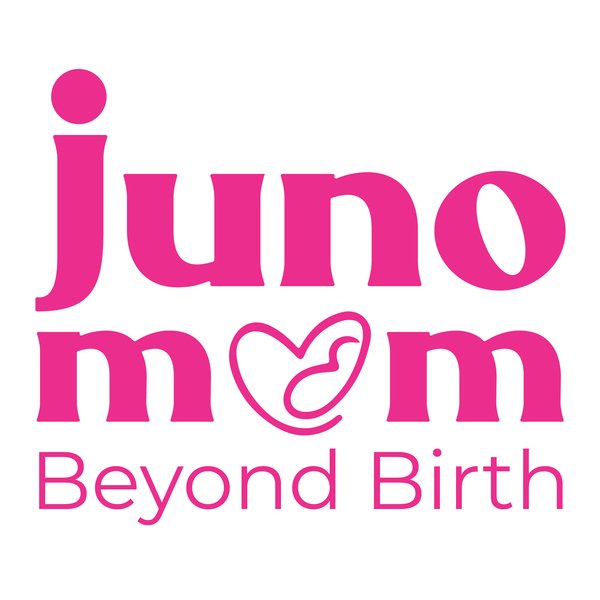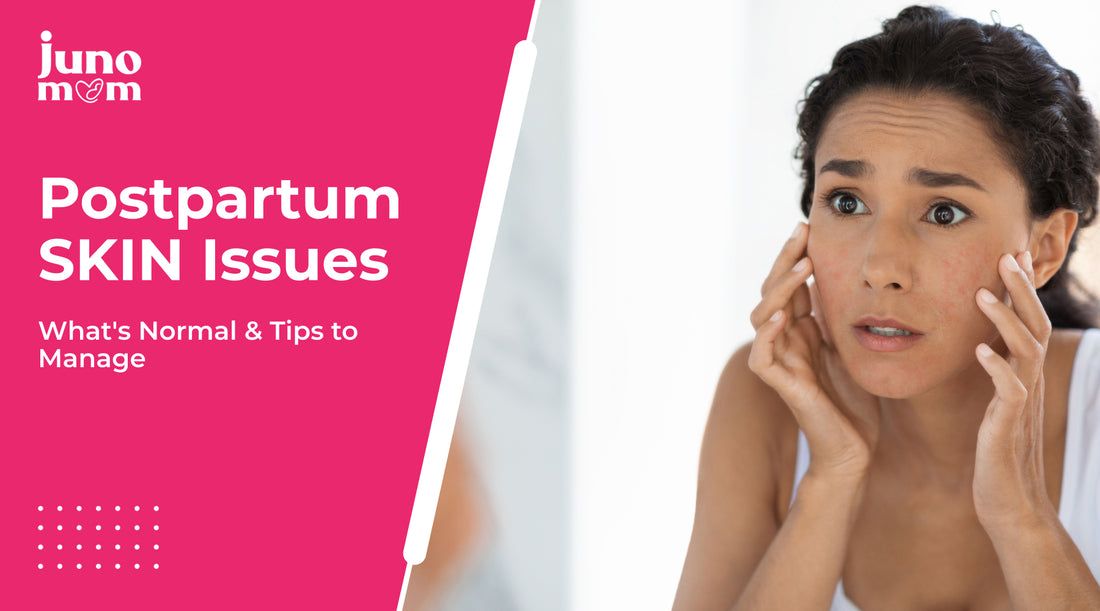Becoming a new mom brings so many changes, from physical recovery to emotional adjustments, and among these shifts, your skin may go through its own transformations. Postpartum skin issues are common and can vary, influenced by hormone changes, new routines, and even sleep (or lack of it!).
At Juno Mom, our concern is physical and emotional postpartum recovery for new moms. This guide will walk you through what’s normal, what causes these changes, and simple ways to manage them.
Understanding Postpartum Skin Changes

During pregnancy, your body underwent several hormone changes that impacted your skin. After childbirth, hormone levels like estrogen and progesterone drop quickly, which can lead to various skin changes. Combined with the physical recovery of birth, lack of sleep, and adjusting to a new routine, these changes may become more noticeable in the weeks after delivery.
Common Postpartum Skin Issues and How to Manage Them
Acne Breakouts

Why it happens: Hormone fluctuations can increase sebum (oil) production, leading to clogged pores and breakouts.
How to manage: Use gentle, non-comedogenic (won’t clog pores) products. Look for cleansers with salicylic acid— safe options to help clear breakouts when used sparingly. Avoid harsh scrubs, which can irritate sensitive skin.
Melasma (Hyperpigmentation)

Why it happens: Also called the “mask of pregnancy,” melasma can leave dark patches, usually on the cheeks and forehead.
How to manage: You must try a vitamin C serum for brightening, but consult your dermatologist for stronger treatments if it doesn’t fade. Sun protection is also the key! Use SPF every day and consider wearing a hat if you’re outside for extended periods.
Stretch Marks

Why it happens: Rapid skin stretching on areas like the belly, thighs, and breasts during pregnancy can lead to stretch marks.
How to manage: Moisturize daily with creams or oils rich in hyaluronic acid, shea butter, or cocoa butter. These don’t erase stretch marks but can keep skin soft and support healing over time. Some dermatological treatments, like microneedling, can help, but it’s okay to embrace them as a mark of your motherhood journey, too.
Dryness and Flakiness

Why it happens: Hormone changes and lack of hydration can lead to dry, flaky skin.
How to manage: Use a hydrating moisturizer with ceramides and hyaluronic acid to lock in moisture. Staying hydrated by drinking plenty of water also helps keep your skin soft and comfortable.
Loose or Sagging Skin

Why it happens: It takes time for skin to regain elasticity after being stretched.
How to manage: Give your skin time to heal. Gentle massages, collagen-boosting products, and postpartum-safe exercises can improve firmness. If this bothers you, talk to your doctor about safe options for skin tightening.
Postpartum Hair Loss and Scalp Health

Why it happens: Hair loss, is common as hormone levels stabilize after childbirth.
How to manage: Use gentle, sulfate-free shampoos and consider adding a hydrating scalp treatment if needed. Hair will usually start growing back over a few months, but consult a doctor if you’re concerned.
Postpartum Skincare Tips

- Avoid introducing too many products at once. A gentle cleanser, moisturizer, and sunscreen are often enough to keep skin feeling fresh and cared for.
- Small, daily efforts like moisturizing and using SPF will make a difference over time.
- Although sleep can be challenging with a newborn, even short naps help your body, and your skin, recover. Drink water regularly to support skin hydration.
- If family and friends offer to help, accept it. This gives you a bit of downtime for self-care, which can make a difference for your well-being.
If certain skin issues persist or worsen, like severe acne, painful or intensely itchy areas, or melasma that doesn’t fade, consider consulting a dermatologist. They can suggest advanced treatments, like topical medications or professional skincare solutions.
Embrace the Change

Every mother’s postpartum journey is unique, and these skin issues are a natural part of the changes you’re experiencing. By embracing simple, gentle care and giving yourself grace and patience, your skin can adapt and recover beautifully in its own time. Remember, postpartum is a phase, and with time and self-care, your skin will find its balance again.


